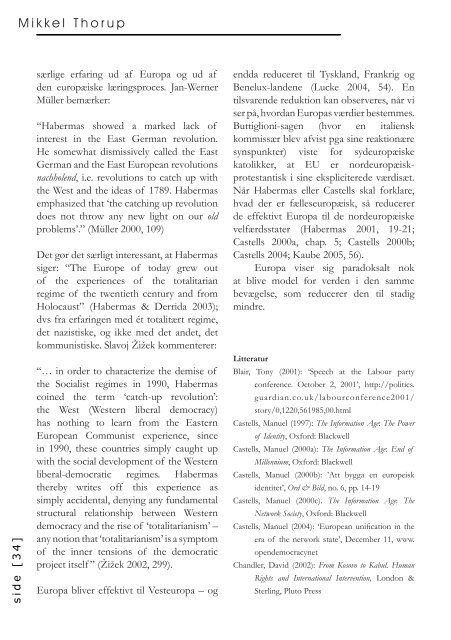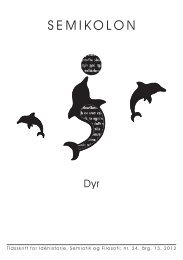S E M I KO L O N - EgernInc
S E M I KO L O N - EgernInc
S E M I KO L O N - EgernInc
Create successful ePaper yourself
Turn your PDF publications into a flip-book with our unique Google optimized e-Paper software.
s i d e [ 3 4 ]<br />
M i k k e l T h o r u p<br />
særlige erfaring ud af Europa og ud af<br />
den europæiske læringsproces. Jan-Werner<br />
Müller bemærker:<br />
“Habermas showed a marked lack of<br />
interest in the East German revolution.<br />
He somewhat dismissively called the East<br />
German and the East European revolutions<br />
nachholend, i.e. revolutions to catch up with<br />
the West and the ideas of 1789. Habermas<br />
emphasized that ‘the catching up revolution<br />
does not throw any new light on our old<br />
problems’.” (Müller 2000, 109)<br />
Det gør det særligt interessant, at Habermas<br />
siger: “The Europe of today grew out<br />
of the experiences of the totalitarian<br />
regime of the twentieth century and from<br />
Holocaust” (Habermas & Derrida 2003);<br />
dvs fra erfaringen med ét totalitært regime,<br />
det nazistiske, og ikke med det andet, det<br />
kommunistiske. Slavoj Žižek kommenterer:<br />
“… in order to characterize the demise of<br />
the Socialist regimes in 1990, Habermas<br />
coined the term ‘catch-up revolution’:<br />
the West (Western liberal democracy)<br />
has nothing to learn from the Eastern<br />
European Communist experience, since<br />
in 1990, these countries simply caught up<br />
with the social development of the Western<br />
liberal-democratic regimes. Habermas<br />
thereby writes off this experience as<br />
simply accidental, denying any fundamental<br />
structural relationship between Western<br />
democracy and the rise of ‘totalitarianism’ –<br />
any notion that ‘totalitarianism’ is a symptom<br />
of the inner tensions of the democratic<br />
project itself ” (Žižek 2002, 299).<br />
Europa bliver effektivt til Vesteuropa – og<br />
endda reduceret til Tyskland, Frankrig og<br />
Benelux-landene (Lucke 2004, 54). En<br />
tilsvarende reduktion kan observeres, når vi<br />
ser på, hvordan Europas værdier bestemmes.<br />
Buttiglioni-sagen (hvor en italiensk<br />
kommissær blev afvist pga sine reaktionære<br />
synspunkter) viste for sydeuropæiske<br />
katolikker, at EU er nordeuropæiskprotestantisk<br />
i sine ekspliciterede værdisæt.<br />
Når Habermas eller Castells skal forklare,<br />
hvad der er fælleseuropæisk, så reducerer<br />
de effektivt Europa til de nordeuropæiske<br />
velfærdsstater (Habermas 2001, 19-21;<br />
Castells 2000a, chap. 5; Castells 2000b;<br />
Castells 2004; Kaube 2005, 56).<br />
Europa viser sig paradoksalt nok<br />
at blive model for verden i den samme<br />
bevægelse, som reducerer den til stadig<br />
mindre.<br />
Litteratur<br />
Blair, Tony (2001): ‘Speech at the Labour party<br />
conference. October 2, 2001’, http://politics.<br />
guardian.co.uk/labourconference2001/<br />
story/0,1220,561985,00.html<br />
Castells, Manuel (1997): The Information Age: The Power<br />
of Identity, Oxford: Blackwell<br />
Castells, Manuel (2000a): The Information Age: End of<br />
Millennium, Oxford: Blackwell<br />
Castells, Manuel (2000b): ’Att bygga en europeisk<br />
identitet’, Ord & Bild, no. 6, pp. 14-19<br />
Castells, Manuel (2000c). The Information Age: The<br />
Network Society, Oxford: Blackwell<br />
Castells, Manuel (2004): ‘European unification in the<br />
era of the network state’, December 11, www.<br />
opendemocracynet<br />
Chandler, David (2002): From Kosovo to Kabul. Human<br />
Rights and International Intervention, London &<br />
Sterling, Pluto Press












